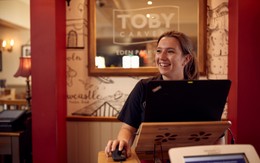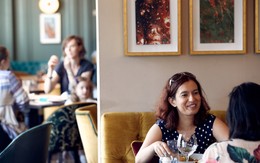This month Mitchells & Butlers has revealed the benefits it gains from a proactive approach to employee personal development that supports those who wish to take on volunteering roles. The company encourages employees development opportunities outside the workplace as it not only benefits the community but also plays a role in enhancing their workplace skillset. This has been emphasised by four Mitchells & Butlers' employees taking on telephone befriending roles for the Licensed Trade Charity, to give something back by easing the isolation felt by some former hospitality industry staff.
Mitchells & Butlers employees are encouraged to pull together a personal development plan, a blank canvas that allows them to shape what they would like to do, with support and input from their line manager. It might be focussed solely on work related development or it could be something completely different outside work, such as a volunteering role, that will also help develop transferrable skills that can be used in the workplace too.
Head of Employee Relations, Caroline Davies said: "We are really passionate about employees' personal development at Mitchells & Butlers, and have policies in place that allow us to support those who wish to take on volunteering roles. For example, we allow reservists up to ten additional days' paid leave per year to carry out required training, and we have extended this to an employee who has become a volunteer rescuer so he can complete his training and be able to respond to emergencies."
Caroline says that by providing employees with the freedom and support to volunteer provides noticeable improvements in what individuals are able to offer the company in their roles: "It makes employees more confident and provides transferable skills they can bring back into the workplace, such as being more organised, communicating effectively and with more clarity, enhancing their listening skills and attempting things they might not have previously. Our support gives them the chance to experience new things without it affecting their everyday working life, which increases their overall job satisfaction, their morale and engagement with us, and generally makes them happier at work.
A prime example of the benefits the company is deriving from its innovative approach to volunteering and training is Claire Williams, who works in HR. Claire became a volunteer telephone befriender in December for the Licensed Trade Charity, which helps pub and bar people. Four months on she is already noticing the benefits it is bringing to her, as well as the befriendee who she is helping to overcome feelings of isolation.
Claire said: "This is my first time volunteering at the age of 42 and I would definitely recommend it. It has given me more confidence to speak to people, broadened my communication skills and taught me that not all people can be treated the same way. I've been asked to speak at the next team briefing to discuss what I do. Before telephone befriending I wouldn't have had the confidence or belief to stand in front of a room of one hundred people, but giving me something to talk about that I enjoy will mean I can do more public speaking in the future".
Telephone befriending is just one area in which the Licensed Trade Charity helps and supports pub and bar people. The charity also provides a free 24-hour helpline, giving help and advice on topics ranging from mental health to housing and money, can offer free counselling sessions and also gives grants to those in need.





